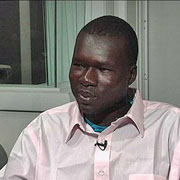-
(单词翻译:双击或拖选)
'Lost Boy' Returns to Help South Sudan Village
Like many college students, Aruna Kenyi went home over the summer to see his family. Unlike most of his peers1 though, the 22 year old's journey took him halfway2 around the world to his native Sudan - or to what used to be Sudan - and is now the new independent Republic of South Sudan.
It was the first trip home in 16 years for the University of Maine-Farmington senior. When he visited his birthplace of Kansuk, the memories came flooding back. His recollections are of civil war and how, as a 5-year-old boy, he and his three brothers were separated from their parents when militiamen ransacked3 his village.
Thinking their parents had been killed, the brothers joined thousands of other so-called ‘Lost Boys,’ wandering from village to village, fleeing war and famine.
“We ended up in a camp in Uganda. That's where we filled the applications for coming to the U.S.," he says. "And in November 2003, we finally were moved to the U.S.. The first state that we lived in was Virginia, and after that we moved to Maine because we knew some people that we used to live in the camp with that live in Maine so we decided4 to move here.”
 |
| Aruna Kenyi took this picture of a teacher with his students in Kansuk, South Sudan, where Kenyi hopes to establish a free lunch program. |
But Kenyi never lost the connection he feels to his homeland. In 2005, he learned that his parents had survived the war back home. Earlier this year, he voted in elections for South Sudanese independence.
And, as part of his studies at the University of Maine where he is majoring in community health education, Kenyi proposed setting up a high school lunch program in Kansuk.
“I really feel the need that if children are fed they are more likely to learn better, and perform better in school," Kenyi says. "It also improves their health. So I went there with the thought of wanting to start a school lunch program, but it didn't turn out the way I wanted it to be. I didn't have enough funding to start the program.”
Before the trip, Kenyi set an ambitious5 goal of raising $90,000; the cost of providing a daily meal for all 500 kids at the local high school for one year. With the $2,600 he did collect, Kenyi bought water containers so the students have access to clean drinking water. He also set up a sponsorship program to pay volunteer teachers at the village kindergarten.
During his trip, Kenyi discovered that the children needed a lot more than school lunches.
 |
| University of Maine student Aruna Kenyi set up a fresh drinking water program in his native South Sudan village and hopes to follow up with a free school lunch program. |
“They have so much need at this school, needs such as a library. They don't have textbooks at this school. There are about one textbook for one class, and they don't even have enough chairs and tables for students. Some students sit on the floor at this school.”
There's also a critical shortage6 of teachers even though the average class size is about 100 students. But Kenyi's primary concern remains7 the school nutrition program.
The school cannot provide lunches and, he explains, that means many kids have nothing to eat all day.
“So they go from eight to four, and once they get home they get to eat something if there is food at home. But at school there is no food,” Kenyi says. "So the students, sometimes at lunch break, they get an hour for lunch. For most students, the distance from school to home is about two hours. A lot of them just decide to go home and not back to school.”
Kenyi is determined8 to continue fundraising to meet his goal of setting up a school lunch program in Kansuk. He's approaching church groups, schools and colleges in New England and beyond, for financial support. A successful nutrition program in Kansuk, he hopes, will provide a model for other districts in South Sudan to do the same.
And one day, he says, he plans to return to his country to work as a teacher.
 收听单词发音
收听单词发音
1
peers

|
|
| n.同等的人,贵族vi.凝视,窥视vt.与…同等,封为贵族v.凝视( peer的第三人称单数 );盯着看;同等;比得上 | |
参考例句: |
|
|
|
2
halfway

|
|
| adj.中途的,不彻底的,部分的;adv.半路地,在中途,在半途 | |
参考例句: |
|
|
|
3
ransacked

|
|
| v.彻底搜查( ransack的过去式和过去分词 );抢劫,掠夺 | |
参考例句: |
|
|
|
4
decided

|
|
| adj.决定了的,坚决的;明显的,明确的 | |
参考例句: |
|
|
|
5
ambitious

|
|
| adj.有雄心的,劲头十足的,有野心的 | |
参考例句: |
|
|
|
6
shortage

|
|
| n.缺少,缺乏,不足 | |
参考例句: |
|
|
|
7
remains

|
|
| n.剩余物,残留物;遗体,遗迹 | |
参考例句: |
|
|
|
8
determined

|
|
| adj.坚定的;有决心的 | |
参考例句: |
|
|
|















